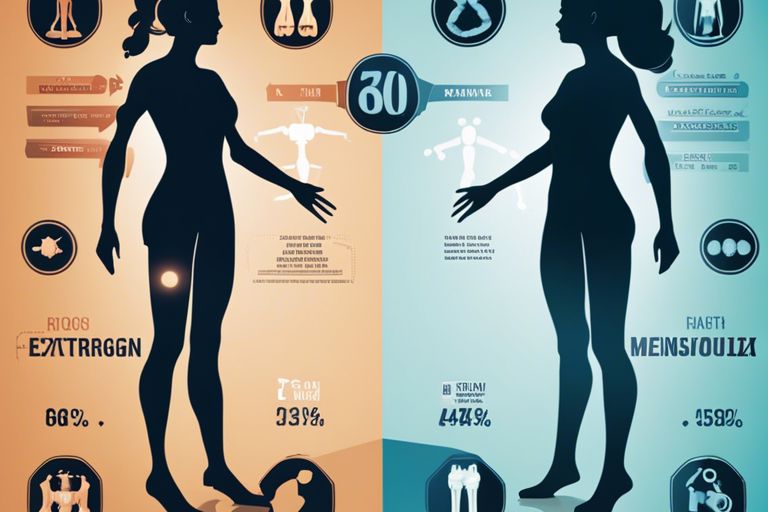Menopause is a normal, natural part of a woman’s life cycle, marking the end of her reproductive years. Understanding the stages of menopause can help women navigate this significant transition with more ease and knowledge. From perimenopause, with its fluctuating hormones and irregular periods, to the postmenopausal stage, where symptoms like hot flashes and mood changes may persist, each phase brings its own set of challenges and adjustments. By delving into the distinct stages of menopause, women can better prepare themselves emotionally and physically for the changes that come with this inevitable ageing process. Let’s explore the stages of menopause in detail to empower women to embrace this new chapter of life with confidence and understanding.
Key Takeaways:
- Menopause is a natural biological process that marks the end of a woman’s menstrual cycle and fertility.
- Perimenopause is the transitional phase leading up to menopause, characterised by hormonal fluctuations and irregular periods.
- Menopause symptoms can vary widely and may include hot flushes, mood swings, fatigue, and changes in libido.
- Postmenopause begins after menopause and can last for many years, during which symptoms such as vaginal dryness and osteoporosis risk may persist.
- Healthy lifestyle choices such as regular exercise, a balanced diet, and managing stress can help alleviate menopausal symptoms and promote overall well-being.
The Phases of Menopause
Perimenopause
Perimenopause is the phase leading up to menopause, usually starting in a woman’s 40s but can begin earlier. During this time, hormone levels fluctuate, leading to irregular menstrual cycles, hot flushes, and other symptoms. It can last for several years before menopause is reached.
Menopause
Menopause is officially reached when a woman has not had a menstrual period for 12 consecutive months. This usually occurs in the late 40s to early 50s. As oestrogen levels decline, women may experience symptoms like night sweats, mood swings, and vaginal dryness. Hormone replacement therapy and lifestyle changes can help manage these symptoms.
In addition to the physical symptoms, menopause can also impact a woman’s emotional well-being. Many women report feeling a sense of loss or mourning for their reproductive years, coupled with relief from the end of menstrual cycles.
Postmenopause
Postmenopause begins after menopause and lasts for the rest of a woman’s life. During this phase, symptoms like hot flushes and mood swings may lessen, but long-term health concerns such as osteoporosis and heart disease become more relevant. It is crucial for women to continue monitoring their health and adapting to the changes brought on by menopause.
Postmenopause is a time for women to focus on maintaining good overall health through regular exercise, a balanced diet, and appropriate medical screenings. It is important to address any concerns or symptoms that arise during this phase to ensure a healthy and fulfilling life beyond menopause.
Symptoms and Signs of Each Stage
Common Symptoms of Perimenopause
Perimenopause, the stage leading up to menopause, is characterised by irregular periods, hot flushes, night sweats, mood swings, and vaginal dryness. Women may also experience changes in their sleep patterns and libido during this stage. These symptoms can vary in severity and may last for several years before menopause is reached.
Menopausal Transition and Symptoms
During the menopausal transition, women may experience more pronounced symptoms such as increased hot flushes, mood changes, weight gain, and cognitive issues. Vaginal dryness and low libido can also persist during this stage. It is important for women to consult with their healthcare provider to discuss management strategies for these symptoms.
Postmenopausal Health Considerations
After reaching menopause, women should pay attention to their bone health, heart health, and mental wellbeing. Due to the hormonal changes that occur during menopause, women are at a higher risk of osteoporosis and heart disease. Regular exercise, a balanced diet, and adequate intake of calcium and vitamin D are important for maintaining overall health in the postmenopausal stage.
Managing Menopause
Lifestyle Adjustments
Making lifestyle adjustments can help manage menopausal symptoms effectively. Engaging in regular exercise, maintaining a healthy diet rich in fruits and vegetables, staying hydrated, and getting enough sleep are crucial. Avoiding triggers such as caffeine, alcohol, and spicy foods can also help alleviate hot flashes and mood swings.
Medical Interventions and Therapies
Medical interventions and therapies can be considered for women experiencing severe menopausal symptoms. Hormone replacement therapy (HRT) can help balance hormone levels and reduce hot flashes and vaginal dryness. Other medications may be prescribed to manage specific symptoms such as antidepressants for mood swings or osteoporosis medications to support bone health.
It is important to consult with a healthcare professional to discuss the best options for managing menopausal symptoms. They can provide personalised recommendations based on individual health history and symptoms. It is important to weigh the benefits and risks of each intervention before making a decision.
Understanding the Stages of Menopause
Having a thorough understanding of the stages of menopause is crucial for every woman as it allows them to navigate this natural phase of life with more confidence and knowledge. By recognising the signs and symptoms of perimenopause, menopause, and postmenopause, women can better prepare themselves for the physical and emotional changes that come with each stage. Seeking support from healthcare professionals, making lifestyle adjustments, and exploring treatment options can help women manage menopausal symptoms effectively. With awareness and education, women can embrace this significant life transition with grace and empowerment.
FAQ
Q: What is menopause?
A: Menopause is a natural biological process that marks the end of a woman’s menstrual cycles. It is diagnosed after 12 consecutive months without a menstrual period.
Q: What are the stages of menopause?
A: Menopause has three stages – perimenopause, menopause, and postmenopause. Perimenopause is the period leading up to menopause, menopause is when menstrual cycles stop, and postmenopause follows menopause.
Q: What are the common symptoms of menopause?
A: Common symptoms of menopause include hot flushes, night sweats, mood swings, vaginal dryness, and difficulty sleeping. Every woman’s experience with menopause is unique.
Q: How long does menopause last?
A: The duration of menopause varies for each woman. On average, symptoms may last around four years, but they can continue for up to 12 years in some cases. Postmenopause, the stage after menopause, lasts for the rest of a woman’s life.
Q: How can menopause symptoms be managed?
A: Menopause symptoms can be managed through lifestyle changes, such as maintaining a healthy diet, regular exercise, managing stress, and getting enough sleep. Hormone replacement therapy (HRT) and other medications can also help alleviate symptoms for some women.





